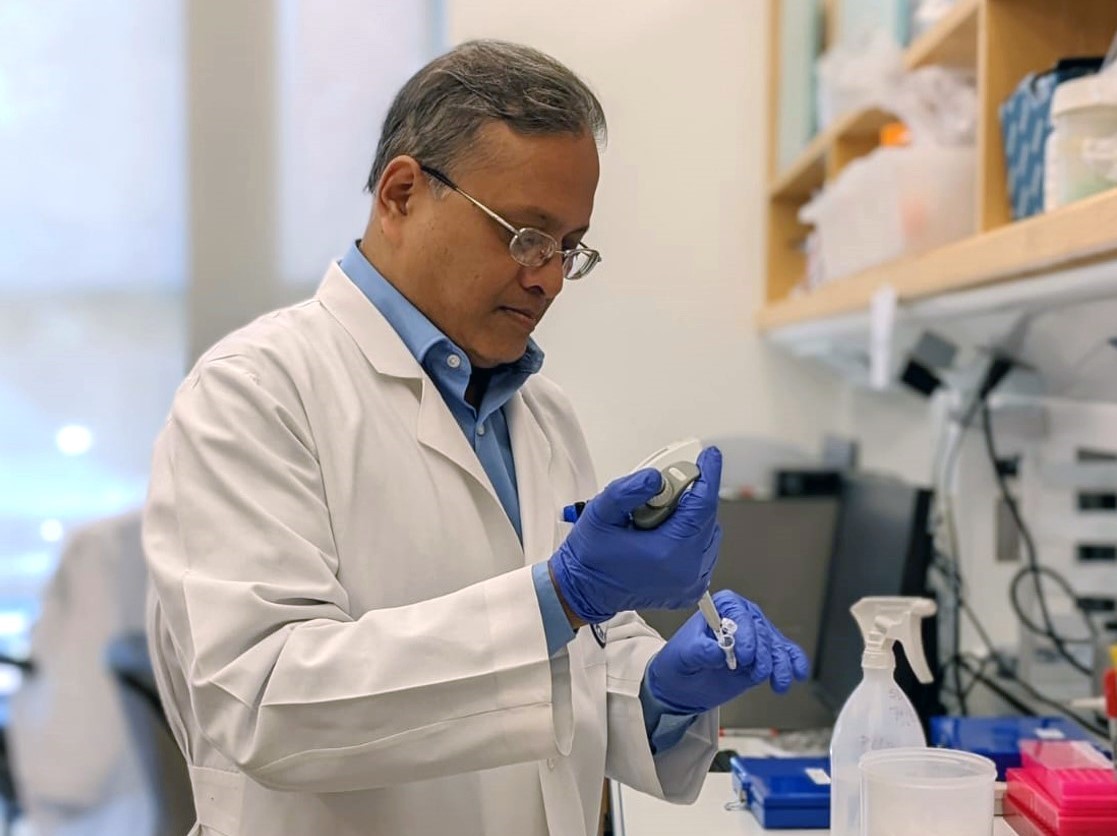USA investigators identify potential biomarker for early pancreatic cancer diagnosis
MOBILE, Ala. – Cancer researchers at the USA Health Mitchell Cancer Institute and the University of South Alabama have identified the TOMM22 protein as a potential biomarker for early diagnosis and prognosis of pancreatic cancer as well as a potentially useful therapeutic target.
“Pancreatic cancer is a very aggressive disease that spreads rapidly, and its early diagnosis is very challenging,” said Santanu Dasgupta, Ph.D., an assistant professor of pathology at the Frederick P. Whiddon College of Medicine and principal investigator of the project. “Moreover, due to the lack of curative treatments at advanced stages, the survival of patients is short. Thus, we urgently need to find ways to detect pancreatic cancer early along with a new line of treatment.”
The team’s research was recently published in Molecular Cancer Research, a journal that features articles describing novel basic cancer research discoveries. Mary O. Haastrup, M.D., Ph.D., who earned her doctoral degree in basic medical sciences from the Whiddon College of Medicine in 2023, is the lead author of the article.
Mitochondria are small organelles in our cells that host about 1,500 proteins. Using these proteins, mitochondria control cellular metabolism, stress, and cell death. Cancer cells wisely use mitochondria to fulfill their high-energy demand, manage stress, and avoid death. The majority of the 1,500 proteins that mitochondria harbor are imported from the cytoplasm into the mitochondria through a unique protein import system. This import system works primarily through proteins known as translocases of the outer mitochondrial membrane (TOMM).
“We discovered that TOMM22, the central outer mitochondrial membrane translocase, is abundantly expressed in patients diagnosed with pancreatic cancer,” Dasgupta said. “When we engineered pancreatic cancer cells to express high amounts of TOMM22, they became more aggressive, indicating that TOMM22 promotes cancer growth and spread. We observed that TOMM22 abundance increased mitochondrial energy production, thereby supporting the aggressive growth of the pancreatic cancer cells.”
On the other hand, when researchers blocked the TOMM22 function, the aggressiveness of the pancreatic cancer cells reduced drastically. “We discovered that when the TOMM22 gate is locked, many essential proteins associated with energy generation and management of stress could not enter the mitochondria of the cancer cells,” Dasgupta said. “As a result, cancer cells experienced stress and became helpless.”
Dasgupta said the lab is working on developing suitable drugs that can block TOMM22. Thus, TOMM22 could be a feasible target to overcome therapeutic inadequacy in pancreatic cancer.
Further, the scientists observed a remarkable increase in the expression of TOMM22 protein from pre-invasive to invasive pancreatic lesions, while it was barely detectable in normal cells. The steady increase in TOMM22 expression was associated with the worst prognosis of pancreatic cancer patients. Strikingly, the progressive increase of TOMM22 expression in these patients turned out to be a better prognostic indicator than tumor grade, Dasgupta noted.
“These findings are very encouraging and necessitate analysis of a large number of patients to establish TOMM22 as a useful biomarker for early diagnosis and prognosis,” he added.
The MCI study is the first to unravel the role of the mitochondrial protein import system in promoting pancreatic cancer. “We have just begun to understand how cancer cells hijack this unique import machinery to achieve their benefits,” Dasgupta said. “A comprehensive characterization of this import pathway in various other cancers may lead to the development of better disease management strategies to ultimately improve the overall survival of cancer patients.”
Additional authors of the study from the Mitchell Cancer Institute and the University of South Alabama include Kunwar Somesh Vikramdeo, Ph.D.; Shashi Anand, Ph.D.; Mohammad Aslam Khan, Ph.D.; James Elliott Carter, M.D.; Seema Singh, Ph.D.; and Ajay Pratap Singh, Ph.D.
Read the abstract in Molecular Cancer Research: “Mitochondrial translocase TOMM22 is overexpressed in pancreatic cancer and promotes aggressive growth by modulating mitochondrial protein import and function.”

Stay Connected
Fill out and submit the form below to get regular updates from Mobile Chamber delivered directly to your inbox.






